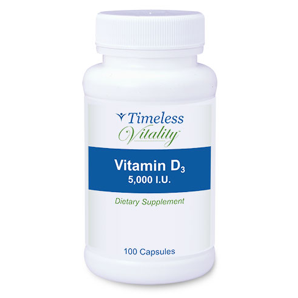
The sun is the best source for Vitamin D. Small amounts of Vitamin D can also be found in some foods such as raw milk, wild-caught fish, egg yolks, sardines, and mushrooms. However, it’s impossible to get adequate amounts from food alone.
Studies have shown that a lack of adequate Vitamin D is the top deficiency in American people. The National Institute of Health has estimated that up to 75% of the population is lacking, based on blood serum levels of 30 nanograms per milliliter (ngmL). For optimal health and disease-prevention, LEVELS SHOULD BE GREATER THAN 50.
Why is Vitamin D deficiency at epidemic levels?
First, many people use sunscreen, which blocks the UV rays needed by the body to produce Vitamin D. Folks also cover up when going outside which also prevents UV rays from reaching the skin. Society has become much more aware of the dangers of sun exposure, mainly skin cancer; It’s a real risk. There is also more of a hyper-awareness regarding premature aging caused by sun exposure. Also, the further away from the equator that you live, the less sunlight that you receive.
Additionally, even if attaining enough sun exposure, not everyone absorbs Vitamin D the same way. The darker your skin, the harder it is for you to absorb it. If you are overweight, especially around the belly area, Vitamin D may be going into your fat cells for storage where it is not accessible to the other parts of your body. If you have gut trouble or a chronic gastrointestinal problem that affects your body’s ability to absorb fat, this will also inhibit absorption of D. Lastly, if you are over 50, your body produces less.
Vitamin D has a huge impact on long term health. Numerous studies have shown that people who have higher Vitamin D levels have as much as a 67% decrease in developing internal cancers and actually increases the odds of surviving cancer!
Vitamin D has anti-inflammatory properties and helps keep the immune system boosted. It’s important for bone health, and prevention of cardiovascular disease, diabetes, and lung disease. It has both antimicrobial and antiviral properties so people who have adequate amounts of D also get sick less.
An incidental finding in a study that was done comparing one group taking a supplement of 4,000 IUs per day to another taking placebo showed that the people taking the Vitamin D supplement had lower waist to hip ratios as well.
How do you know if YOU are Vitamin D deficient?
It is as easy as getting a blood test. There are also symptoms associated with chronic deficiencies including:
- Osteomalacia, or painful bones
- Chronic back pain
- Bone loss (osteopenia and osteoporosis)
- Chronic fatigue
- Frequent viral and bacterial infections
- Depressed mood (feeling blue)
- Excessive head-sweating
- Hair loss
- Muscle pain
- Increased blood pressure
- Inability to lose weight
- Increased anxiety
- Candida (yeast) infections
- Metabolic syndrome
- Hormone imbalances, including thyroid
- Weakened teeth
- Increased risk for Hashimoto’s Disease
- Increased risk for autoimmune diseases like Lupus
- Increased risk for Grave’s Disease
- Irritable bowel syndrome
- Increased risk for cardiovascular disease, diabetes, and cancer
The sun is the most natural way to obtain Vitamin D. Ideally, spending 20 minutes outside wearing a tank top and shorts in direct sun would provide 5,000 to 10,000 IUs. However, this is not an option for most people.
Fortunately, all that is needed to increase your D levels is to take a good quality supplement on a daily basis. Because there are so many variables as to how how well it is absorbed, some people need more than others. Generally, it is recommended that 2,000 to 10,000 IUs of VITAMIN D3 be taken. (5,000 IUs is optimal for the average person). It can be obtained over the counter without a prescription. Vitamin D2 is another form of supplementation but it is only available with a prescription and absorption rates are not near as high.
For children who are Vitamin D deficient, it is recommended that a supplement of 400 IUs be taken, and for teenagers, 2,000 IUs.
Because D is fat soluble, it needs to be taken with fat. We recommend that you purchase your Vitamin D3 in a gel-cap form. For optimal absorption, take it with a teaspoon of olive oil, coconut oil, or avocado oil. It can also be taken at the same time as a Fish Oil or Omega supplement to ensure absorption. You can also take it with a meal containing healthy fats.
Several studies have proven that some people do not absorb Vitamin D as effectively as others, so it is important to be tested one or two times per year.
At Renewed Vitality we offer our own high quality Vitamin D supplements – Timeless Vitality. You can order 1,000, 5,000 or 10,000 IU through our online store. CLICK HERE

Leave a Reply